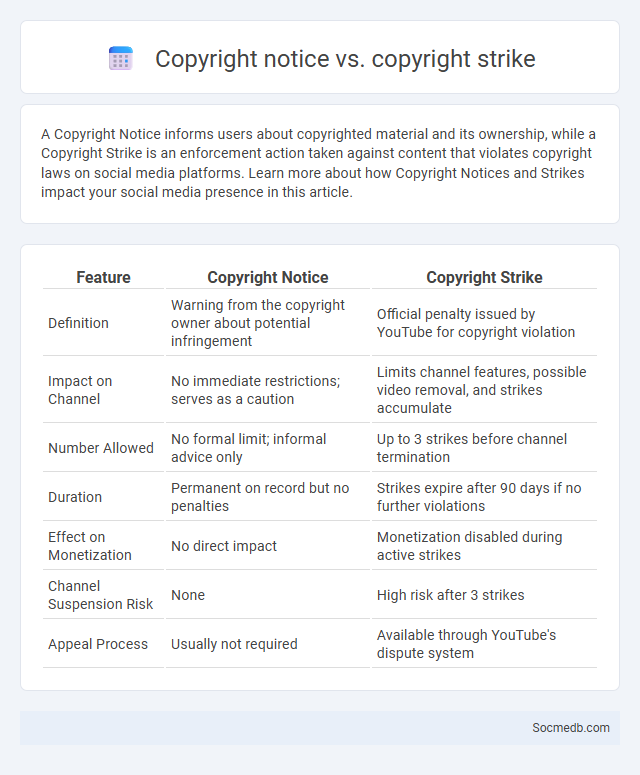
Photo illustration: Copyright Notice vs Copyright Strike
A Copyright Notice informs users about copyrighted material and its ownership, while a Copyright Strike is an enforcement action taken against content that violates copyright laws on social media platforms. Learn more about how Copyright Notices and Strikes impact your social media presence in this article.
Table of Comparison
| Feature | Copyright Notice | Copyright Strike |
|---|---|---|
| Definition | Warning from the copyright owner about potential infringement | Official penalty issued by YouTube for copyright violation |
| Impact on Channel | No immediate restrictions; serves as a caution | Limits channel features, possible video removal, and strikes accumulate |
| Number Allowed | No formal limit; informal advice only | Up to 3 strikes before channel termination |
| Duration | Permanent on record but no penalties | Strikes expire after 90 days if no further violations |
| Effect on Monetization | No direct impact | Monetization disabled during active strikes |
| Channel Suspension Risk | None | High risk after 3 strikes |
| Appeal Process | Usually not required | Available through YouTube's dispute system |
Understanding Copyright: Key Concepts
Understanding copyright in social media revolves around recognizing ownership rights of original content such as images, videos, and text posted online. Your rights protect you from unauthorized use, while respecting others' copyrights avoids legal issues and content removal. Key concepts include fair use, licensing agreements, and the importance of attributing creators properly to maintain ethical sharing practices.
What is a Copyright Notice?
A copyright notice is a legal statement that indicates the ownership of intellectual property and protects original content on social media platforms. It typically includes the (c) symbol, the year of publication, and the name of the copyright holder, ensuring proper attribution and deterring unauthorized use. Displaying a copyright notice on social media posts helps creators safeguard their rights and supports enforcement against content infringement.
Purpose and Importance of a Copyright Notice
A copyright notice on social media protects your original content from unauthorized use, ensuring that your intellectual property rights are clearly communicated to viewers. It helps establish ownership and provides a legal basis for enforcement against infringement, which is crucial in a fast-paced digital environment. Including a copyright notice enhances your brand's credibility and safeguards your creative efforts from piracy and misuse.
What is a Copyright Claim?
A copyright claim occurs when a content creator or rights holder identifies unauthorized use of their protected material on social media platforms. Such claims can lead to content removal, muted audio, or monetization redirected to the copyright owner, affecting Your ability to share original or derivative works. Understanding copyright claims is essential to respecting intellectual property rights and avoiding legal or platform penalties.
What Triggers a Copyright Claim?
Copyright claims on social media are triggered when users upload content containing copyrighted materials such as music, videos, images, or text without proper authorization. Automated content recognition systems, like YouTube's Content ID, scan uploads to detect infringement and notify rights holders. Repeated violations can lead to account penalties, emphasizing the importance of using original content or obtaining licenses.
Explaining Copyright Strikes
Copyright strikes occur when a social media platform identifies and removes content that infringes on copyrighted material, such as videos, music, or images. Receiving multiple copyright strikes can lead to penalties including account suspension or permanent removal, impacting your ability to share and monetize content. Understanding platform-specific copyright policies helps you protect your content and avoid potential legal issues.
Differences Between Copyright Claim and Copyright Strike
A copyright claim on social media typically results in content being monetized or restricted but does not penalize the user's account directly, whereas a copyright strike is a formal infringement notice that can lead to account suspension or termination if multiple strikes accumulate. Claims usually occur when the uploaded content matches copyrighted material, allowing rights holders to control ad revenue or viewership, while strikes indicate unauthorized use with more severe consequences. Understanding these distinctions helps creators navigate copyright enforcement and maintain compliance on platforms like YouTube, Facebook, and Instagram.
Consequences of a Copyright Strike
A copyright strike on your social media account can lead to content removal, restricted account features, or even permanent suspension, severely impacting your online presence. Platforms like YouTube and Instagram enforce strict copyright policies to protect creators, resulting in potential loss of monetization and audience trust. Understanding these consequences helps you manage your content responsibly and avoid damaging your digital reputation.
How to Respond to Copyright Issues
When addressing copyright issues on social media, promptly removing or editing infringing content is essential to comply with platform policies and avoid legal consequences. Utilize the Digital Millennium Copyright Act (DMCA) takedown procedures available on major platforms like Facebook, Instagram, and YouTube to report unauthorized use of copyrighted material effectively. Consistently educating team members on intellectual property laws and monitoring posts helps prevent future copyright infringements and safeguards brand reputation.
Protecting Your Content: Best Practices
Protecting your content on social media involves using watermarks, copyright notices, and metadata to establish ownership and deter unauthorized use. Regularly monitoring platforms with digital tools like Google Alerts or specialized services helps detect content theft swiftly. Employing platform-specific features such as Instagram's copyrighted content removal tools and YouTube's Content ID system further safeguards your intellectual property.
 socmedb.com
socmedb.com